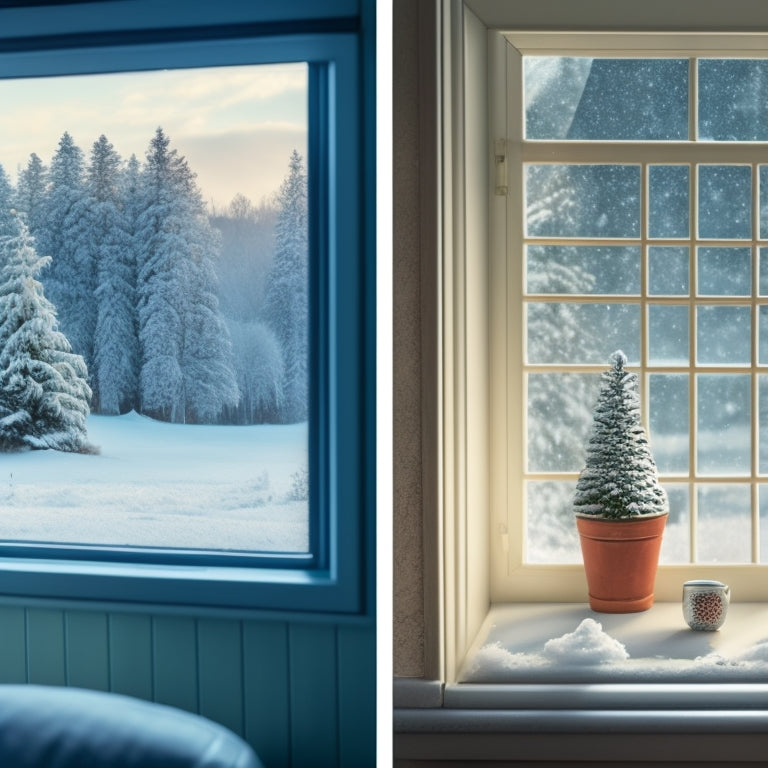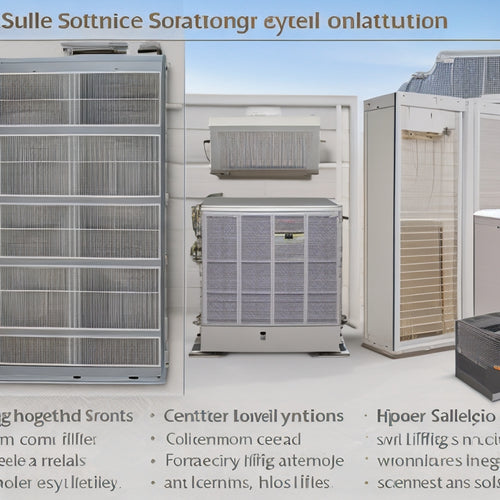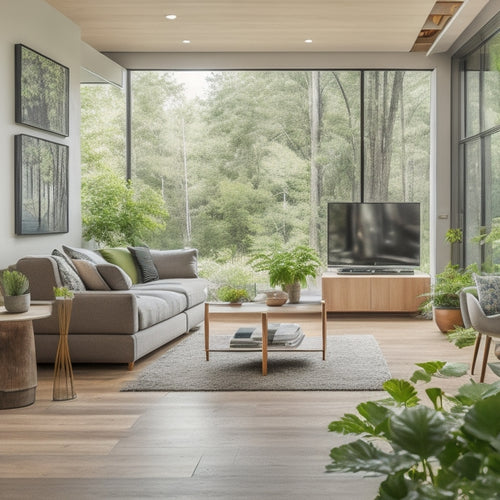
7 Best Window Upgrades for Maximum Energy Savings
Share
When upgrading your windows for maximum energy savings, you'll want to take into account seven key options. Double-glazed windows reduce heat transfer by trapping air between two glass panes, while low-E glass coatings reflect heat to improve energy efficiency. Vinyl frames provide thermal resistance, and triple-pane windows offer significant noise reduction and energy savings. Smart glass technology gives you control over sunlight entering your home, and Energy Star certified window options guarantee high energy efficiency standards. Fiberglass frames provide durability and weather resistance. By exploring these upgrades, you'll be well on your way to minimizing energy costs and maximizing comfort – and there's even more to uncover.
Key Takeaways
- Double-glazed windows reduce heat transfer, minimizing drafts and temperature fluctuations, and can decrease heat loss by up to 50%.
- Triple-pane windows offer significant noise reduction, blocking about 90% of external noise, and can reduce heat loss by up to 50% compared to double-pane models.
- Low-E glass coatings reflect heat, improving energy efficiency, and reduce reliance on HVAC systems, lowering energy bills.
- Vinyl frames are poor heat conductors, enhancing thermal resistance, and require minimal maintenance due to resistance to warping and rotting.
- Energy Star certified windows represent high energy efficiency standards, designed to minimize energy needed for heating and cooling, resulting in long-term cost savings.
Double-Glazed Windows for Insulation
Your old single-pane windows are letting heat escape, driving up your energy bills and making your home less comfortable.
Double-glazed windows, also known as insulated glass units (IGUs), can greatly reduce heat transfer. By trapping a layer of air between two panes of glass, IGUs minimize heat conduction and convection. This results in substantial energy savings, with calculations suggesting that double-glazed windows can reduce heat loss by up to 50%.
In addition, adopting renewable energy sources, such as solar power, can further reduce your carbon footprint and energy costs.
Regular window maintenance tips, such as cleaning and inspecting the seals, can further optimize their performance.
Low-E Glass Coatings for Efficiency
You'll find that low-E glass coatings can greatly improve the energy efficiency of your windows by reducing heat transfer and minimizing the loss of warm air in the winter and cool air in the summer.
These coatings work by applying a thin, metallic layer to the glass surface, which helps to reflect heat rather than absorb it.
Additionally, understanding the environmental impact of improper disposal of hazardous materials, such as solar panel recycling, can further emphasize the importance of energy-efficient solutions.
Glass Coating Benefits
A thin, metallic coating on glass surfaces can greatly impact your home's energy efficiency. When applied to your windows, low-E glass coatings reduce heat transfer, minimizing heat loss in winter and heat gain in summer.
This means you'll rely less on your HVAC system, slashing your energy bills and carbon footprint. By evaluating energy consumption patterns and fuel types, as with fleet auditing assessing energy needs, homeowners can determine suitable energy-saving solutions.
The coating also improves window aesthetics, reducing glare and reflections. Plus, it helps with glass maintenance by preventing moisture buildup and reducing streaks and spots.
Energy Efficiency Ratings
Evaluating energy efficiency ratings is essential to understanding the impact of low-E glass coatings on your home's energy consumption.
You'll want to look for energy labels that indicate a window's performance standards. The National Fenestration Rating Council (NFRC) label is a reliable source for energy efficiency ratings. It provides U-factor, Solar Heat Gain Coefficient (SHGC), and Visible Transmittance (VT) ratings, which measure a window's insulation, heat gain, and light transmission. A lower U-factor and SHGC indicate better energy efficiency, while a higher VT means more natural light.
Furthermore, incorporating renewable energy sources, such as solar-powered fast charging, into your home's energy infrastructure can considerably reduce your carbon footprint.
Vinyl Frames for Thermal Resistance
Behind the scenes of energy-efficient windows, vinyl frames play an essential role in thermal resistance. You want frames that won't conduct heat, and vinyl is a great choice.
It's a poor conductor of heat, meaning it won't transfer warmth from the inside to the outside or vice versa. This helps reduce heat loss in winter and heat gain in summer, leading to better thermal performance.
Vinyl frames also require minimal window maintenance, as they're resistant to warping, cracking, and rotting. Additionally, they're often less expensive than other materials, making them a cost-effective option.
Triple-Pane Windows for Maximum Savings
When you upgrade to triple-pane windows, you'll experience a significant energy efficiency enhancement, which can lead to substantial savings on your utility bills.
In addition, the extra pane of glass provides improved noise reduction benefits, making your home a more peaceful and comfortable living space.
By choosing triple-pane windows, you'll also get durability and strength, ensuring your new windows will withstand the elements and last for years to come.
Furthermore, incorporating solar-powered charging solutions renewable energy sources can further enhance your home's energy efficiency, and fast charging infrastructure can also be integrated to support electric vehicle owners.
Energy Efficiency Boost
Take your energy savings to the next level with triple-pane windows, which can slash heat loss by up to 50% compared to double-pane models.
This significant reduction in heat loss translates to lower energy bills and a reduced carbon footprint.
To enhance the energy efficiency increase, it's crucial to evaluate window placement during installation.
A thorough energy audit can help identify areas of your home where heat loss is most prominent, allowing you to strategically place your triple-pane windows for ideal energy savings.
By doing so, you'll be able to enjoy a more comfortable living space while also doing your part for the environment.
With the right window placement and triple-pane technology, you'll be well on your way to achieving maximum energy savings.
Noise Reduction Benefits
About 90% of external noise is blocked by triple-pane windows, greatly reducing the constant barrage of outside distractions that can disrupt your daily routine.
You'll appreciate the peaceful atmosphere that soundproof windows create, allowing you to focus on your work or relax in silence.
The acoustic insulation in triple-pane windows is unmatched, making them ideal for homes located near busy roads, airports, or noisy neighborhoods.
With these windows, you'll no longer be disturbed by outside noise, enjoying a sense of freedom from the constant din.
Durability and Strength
As you enjoy the peace and quiet provided by triple-pane windows, you can also appreciate their exceptional durability and strength.
These windows are built to last, with high-quality window materials that can withstand harsh weather conditions and minimize maintenance needs.
The triple-pane design provides added protection against air leaks and moisture intrusion, ensuring peak energy performance and reducing the risk of condensation.
With a strong and durable window frame, you can trust that your triple-pane windows will continue to perform at their best, even in extreme temperatures or weather events.
Smart Glass Technology for Climate Control
Climate control is a critical aspect of energy-efficient windows, and smart glass technology has revolutionized the way you manage the temperature in your home.
With smart glass, you can enjoy flexible control over the amount of sunlight that enters your home, reducing the need for artificial lighting and heating or cooling. This state-of-the-art technology allows you to adjust the tint of your windows electronically, providing ideal energy efficiency and comfort.
You can choose from various levels of smart tinting, from clear to opaque, to suit your needs. This means you can block out harsh sunlight during summer or let it in during winter, all while maintaining a consistent and comfortable indoor climate.
Energy Star Certified Window Options
You've examined the benefits of smart glass technology for climate control, but now it's time to contemplate the importance of energy efficiency certifications.
When it comes to window upgrades, Energy Star certified options are a top priority for maximizing energy savings. These certifications guarantee that your windows meet rigorous energy efficiency standards set by the U.S. Environmental Protection Agency.
Here are three key benefits of Energy Star certified window options:
-
Energy Efficiency: Energy Star certified windows are designed to reduce heat transfer, minimizing the energy needed to heat and cool your home.
-
Cost Savings: By reducing energy consumption, you'll see significant cost savings on your utility bills over time.
-
Environmentally Friendly: Energy Star certified windows contribute to a more sustainable future by reducing greenhouse gas emissions and conserving natural resources.
Fiberglass Frames for Durability
Beyond the energy efficiency benefits of Energy Star certified windows, it's important to evaluate the durability of the window frames themselves.
When considering fiberglass frames, you'll find they offer superior weather resistance and require minimal maintenance. Fiberglass is a low-maintenance material that resists warping, cracking, and rotting, ensuring your windows remain functional and secure.
Additionally, fiberglass frames are resistant to pests and corrosion, reducing the likelihood of costly repairs. With fiberglass frames, you can enjoy long-term performance and energy savings without worrying about frequent upkeep.
Frequently Asked Questions
Can I Install Energy-Efficient Windows Myself or Hire a Professional?
You can opt for DIY installation, but consider your skill level and time commitment; if unsure, hiring professional services guarantees a precise fit, proper sealing, and warranty validity, ultimately saving you time and potential future costs.
Do Energy-Efficient Windows Qualify for Government Rebates or Tax Credits?
You'll be pleased to know that energy-efficient windows often qualify for government incentives, such as tax credits or rebates, which can offset the cost of upgrading to advanced window technologies that reduce energy consumption and carbon footprint.
How Long Does It Take to Recoup the Cost of Energy-Efficient Windows?
You'll be waiting an eternity for the savings to add up - not! A thorough cost analysis reveals that with energy savings of up to $465 per year, you'll recoup the cost in as little as 5-7 years, giving you financial freedom and a clear conscience.
Can Energy-Efficient Windows Help Reduce Outside Noise Pollution?
You can effectively reduce outside noise pollution by incorporating soundproofing techniques into your energy-efficient windows, such as using triple-pane glass, acoustic window materials, and specialized frames that minimize sound transmission, granting you a quieter, more peaceful living space.
Are Energy-Efficient Windows More Prone to Condensation or Fogging?
You'll find that energy-efficient windows aren't more prone to condensation or fogging; however, improper installation, high humidity, and temperature differences are common condensation causes. Implementing fogging solutions like using water-repellent coatings or warm-edge spacers can minimize these issues.
Related Posts
-

Why Solar HVAC Filters Revolutionize Home Energy Efficiency
By adopting solar HVAC filters, you're shifting your home's energy reliance from fossil fuels to clean, renewable sou...
-

Why Choose Cool Roofs in Scorching Climates?
You opt for cool roofs in scorching climates because they enable you to reclaim control over your energy consumption ...
-

Why EVs Inspire Earth-Conscious Home Design Choices
As you shift to an electric vehicle, you're not just switching to a greener ride, you're igniting a broader commitmen...


